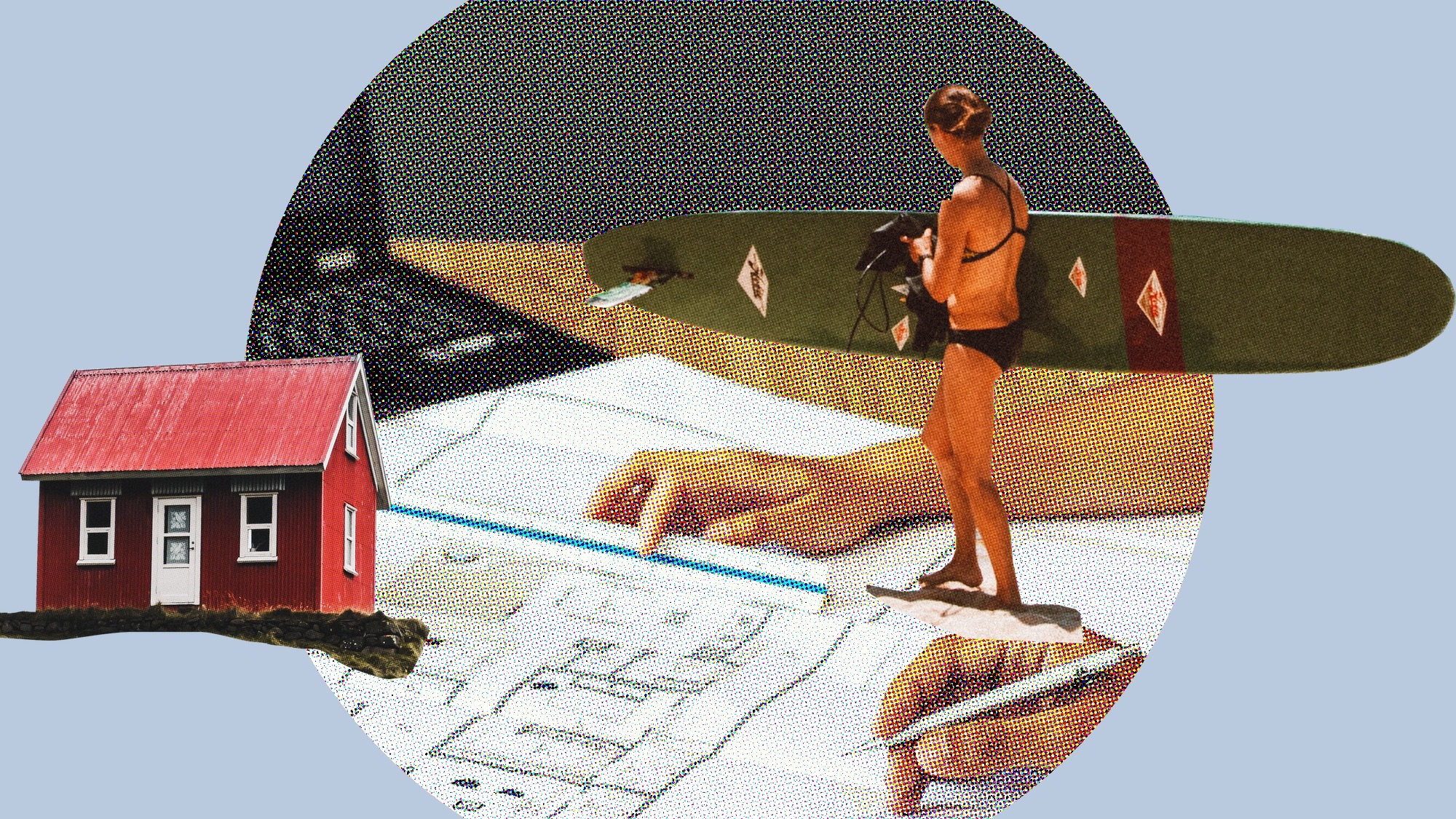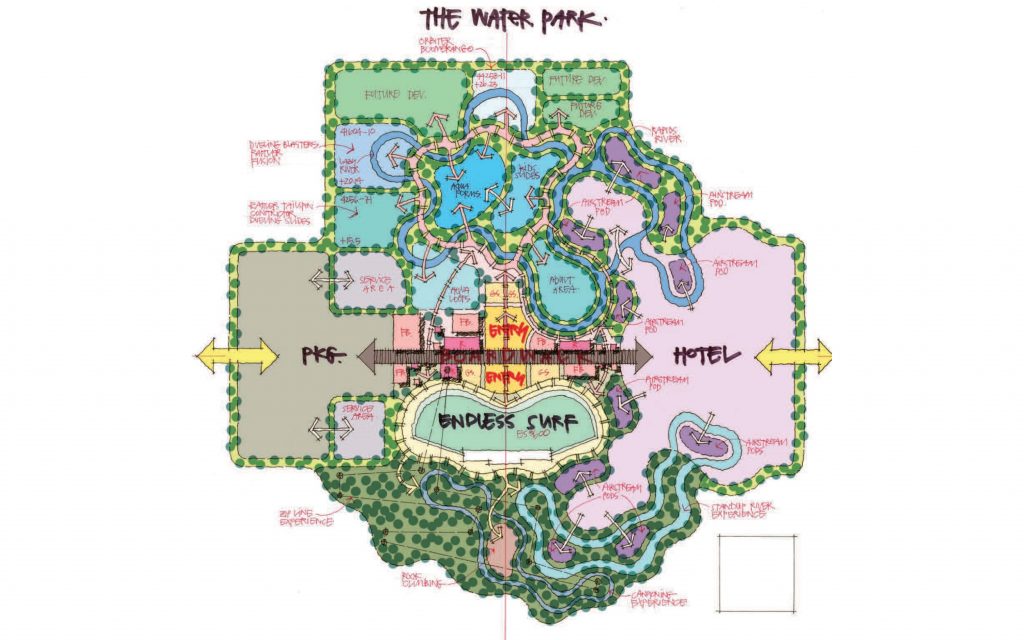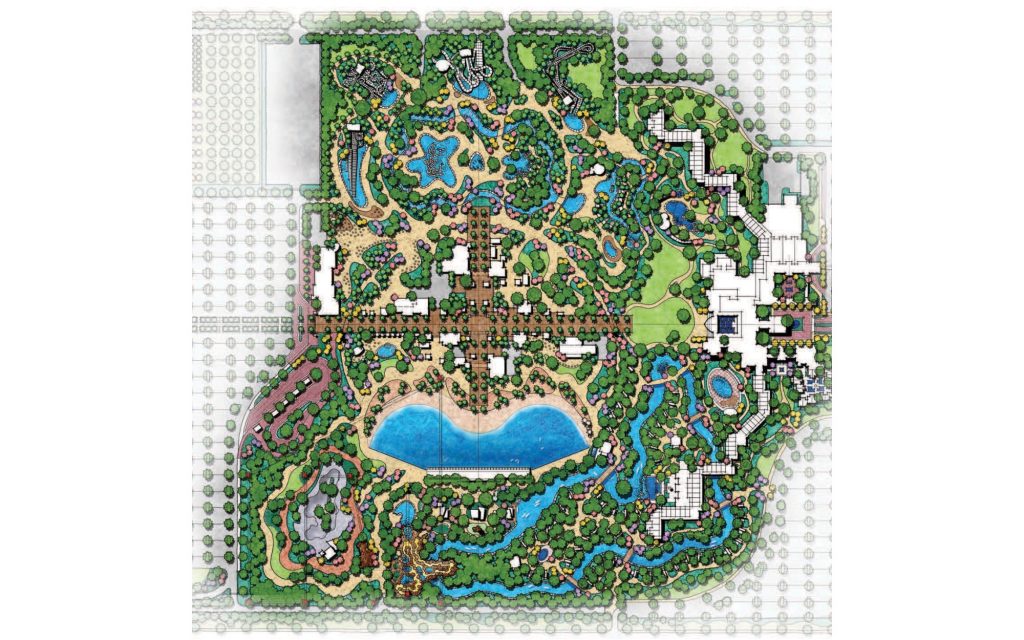The long, long list of details that go into creating a surf destination

How do you design a surf park? Well, the short answer is that the pool goes in the middle, and everything else just gets plopped around it. Easy. Done. The rest is simply a smattering of details. But, in reality, these ‘details’ must accommodate a very complex, layered user group. And that’s where the whole process gets tricky.
When architects design an office building they know that the people who will use that space view it through the lens of a regular working day. So the space has just one main use, to put in a workday. But how do you design a space to suit a wide spectrum of users: families on vacation; surf travelers; spa-goers and a business community out for a lunchtime surf session?
Wave pool architects have to incorporate dining, retail, lodging and many other amenities while keeping up guest-flow and minding the development’s income drivers – all while tying in surfing. Do it poorly and you have a mall court with a noisy splash zone. Do it well and you have an A-List surf park destination.
It’s a complicated process. Fortunately, we found someone to break it all down for us.
Craig Stoner, Principal at landscape architecture firm EDSA, is an expert on a concept called Endless Surf Visioning. We wanted to get down to brass tacks and have Craig explain to us in plain steps, how to design a surf park. He was kind enough to share his time with us. Read on.

What is your background?
As a landscape architect, my career has primarily focused on planning and designing immersive guest experiences for hospitality and entertainment-based client projects. I am most passionate about learning, exploring and then creating environments that positively impact and influence a visitor’s ability to create lasting memories. Some of my most notable assignments include the Seminole Hard Rock Hotel and Casino in Florida, the Kimpton Seafire Resort and Spa in the Cayman Islands and the Hard Rock Hotel & Casino Atlantic City in New Jersey.
Surf parks have evolved and grown in demand as a natural progression and differentiator from waterparks and adventure amenity offerings, serving as a cross-pollination between tourism sectors. Developers are looking to create a unique attraction with an exhilarating appeal found in extreme entertainment parks, while adding a layer of relaxation, lodging and dining for a more multi-faceted, multi-interest experience. It is this balance between luxury hospitality and thrill-seeking exploration that continues to pique my interest and pushes me to expand my knowledge in this space. Most recently, I participated in the Surf Park Central’s Surf Park Summit, where I served as a moderator and discussed EDSA’s philosophy on maximizing the guest experience through engaging design.
The wave pool is the anchor – it’s the showstopper. That’s where everyone wants to be, so why not make it the main attraction?
– Craig Stoner
How is designing a wave pool different from, say, an office building or a home?
We are designing for a more complex, expansive user-group. For example, when creating an office space, we focus on meeting the needs of working tenants and office patrons. For individual homes, outdoor spaces are designed to one’s distinct taste. Alternatively, wave pools and surf parks attract a wider demographic and broader guest base, so each visitor’s journey must be curated with varied experiences based on unique wants and needs.
By design, wave pools typically focus on the beginner/intermediate surfer, but lessons or a thrill ride only last so long. To encourage guests to extend their stays, there must be additional offerings that not only appeal to this niche group of adrenaline junkies but extend to families and friends who may not be solely interested in surf. Conceptualized as a multi-generational, multi-interest destination, activities such as pump tracks, zip-lining and ropes courses may exist amongst the wave pool, but so might a spa, relaxation pool and town center with retail and dining. It is the balance between these design components that make surf parks an all-inclusive, memory-making experience that is enjoyable for all.
It’s something we don’t really think about, but where do you put the wave pool?
The wave pool is the anchor – it’s the showstopper. That’s where everyone wants to be, so why not make it the main attraction? From a planning perspective, the wave pool should be the ‘heart’ of the site and serve as the ‘connector’ and ‘hub’, meaning it provides direct sightlines to surrounding activities so guests can plan their day.
When it comes to a distinct location, developers are not holding back on where these surf parks may appear. We have potential plans being studied on the outskirts of cities, serving as drive-to destinations from dense urban cores. There is also the ability for smaller surf parks and standing wave pools to fit within the existing framework of residential communities. Wave pools have the potential to replace the old clubhouse pool mentality or reinvent an abandoned land parcel. But what about considerations for air temperature and daylight? These are only minuscule challenges in the grand scheme of planning. Pools can be heated, and lights can be added to continue the unique ambiance from day to evening and throughout the year. Imagine surfing in Vermont on Christmas Eve – now that would be something.

What are some of the differences in designing a mixed-use facility rather than a straight-up surf park?
Mixed-use facilities usually don’t have a large theming component. Developers can place an outlet mall or a shopping center almost anywhere and it will easily blend into the surrounding community. On the flip side, surf parks are all about immersing the visitor in the surf culture, which may, or may not be present within the region of development. For instance, locations such as Costa Rica and Southern California have a huge surfer population. If we were to create a surf park in either of those areas, we would let the unique, already present surf vibe guide our theming process. This way, visitors, especially those traveling, will feel like they are not missing out on the traditional surfing experience. Instead, they will feel like the surf park actually enhanced the sense of place.
When it comes to places like Missouri or Wisconsin, where the surf population is much less, we may borrow cues from places with a high surf culture to engulf visitors in an authentic surfing experience with a regional twist. This includes bringing foods, retail stores and water elements that speak to a cohesive. For example, a tiki hut with tropical drinks would be more appropriate than an Italian restaurant.

Share with us some takeaways on how you design for a customer experience.
This really goes back to authenticity and creating a place that feels rooted in that surf culture. We want people who have never surfed before and experts of the sport to walk into our surf parks and say, ‘this feels right’. From the dining options to the shops, to the hardscape and planting palettes, our goal is to immerse visitors in a cohesive, inviting atmosphere – even if the outside surroundings or the location reflect that or not.
In addition, our goal is to make each surf park extremely unique – where every guest can customize their journey. Surf parks should not be treated as commercialized amusement parks. Each should have their own culture and sensibility for a boutique-like experience every time. We also believe that tailoring to the skill level or specific region always enhances the guest experience. It’s all about knowing your market and doing the research. If the area is 80 percent beginners, having an advanced wave pool may not be the best option. We always need to tailor the experience to fit the needs of the end-user.
Are certain wave technologies better for planning a venue?
There is not one wave technology that is better or worse – they all come with their perks and challenges. The planning project at hand will define the type we should be using. For instance, the surf technologies come in varying shapes and sizes. We have done studies on each for developers, and they all serve their own distinct purpose. There is also an energy sustainability piece to each that comes into play when we get further down the line of planning, that often informs our design and the type of technology we plan to use.
Though the use of wave technologies depends on many different factors, it is absolutely essential to get those groups, along with a designer – such as EDSA as the landscape architect, an architect, interior designer, the surf technology vendor and engineer, involved at the project’s inception for the greatest results. By consulting with a well-rounded team early and often, we can better navigate this new industry and ensure each element is carefully curated and integrated seamlessly. Taking a multidisciplinary approach is the key to success when it comes to the development of a surf park.
Related Coverage
